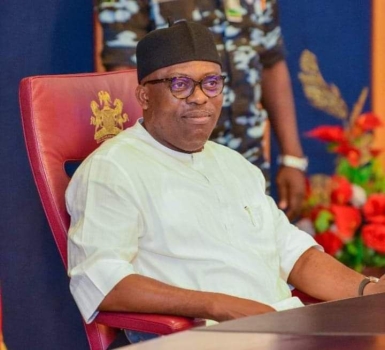Appraising Tinubu’s Emergency Rule in Wild, Wild Rivers
Rivers State has never been a land of quiet politics. It pulses with oil wealth, yet its riches have never translated into peace. The latest turmoil—Governor Siminalayi Fubara, his Deputy and 27 lawmakers’ suspension; the dramatic takeover by a military administrator, and an explosion on the Trans Niger Pipeline—reads like the script of an old, familiar tragedy.
President Bola Ahmed Tinubu’s state of emergency, declared on March 18, has only deepened the uncertainty. The streets of Port Harcourt hum with nervous speculation. Power has shifted overnight. But to what end?
For decades, Rivers has been a battlefield—not just for militants and oil thieves, but for politicians wielding influence like a weapon. This time, the fight is not about resource control or environmental justice; it is a bitter duel between Fubara and his predecessor, Nyesom Wike, the current Minister of the Federal Capital Territory (FCT).
Once allies, now rivals, their power struggle has paralyzed governance and turned the state assembly into a theater of chaos. The impeachment threats, the controversial demolition of the assembly complex, and the relentless maneuvering of Wike’s loyalists in the legislature all set the stage for Tinubu’s intervention.
But was emergency rule the only way out? The explosion at the Trans Niger Pipeline—coincidentally or not—came just as the impeachment crisis reached its boiling point. The blast, which sent thick plumes of smoke over Bodo, disrupted the flow of 245,000 barrels of crude per day.
For a nation whose economy leans desperately on oil revenue, this was more than an environmental disaster; it was an economic threat. Was it sabotage? An act of desperation from aggrieved political players? No one has claimed responsibility, but the timing is impossible to ignore.
Read Also:
Tinubu has framed his decision as one of necessity. Section 305 of the Constitution grants him the power to impose emergency rule, suspending democratic structures in favor of military oversight. Now, retired Vice Admiral Ibok-Ette Ibas holds the reins of Rivers State.
Supporters of this drastic step say it was the only way to break the deadlock and restore order. Critics call it an overreach, an unconstitutional flexing of federal muscle that bypasses democratic processes. The Nigerian Bar Association has condemned it. Peter Obi calls it reckless.
Even among the people of Rivers, there is unease. Military trucks now roll through the streets, a stark reminder of how quickly political crises can erode civil governance. The deeper question lingers: Will this intervention bring lasting stability, or is it just another chapter in Rivers’ cycle of unrest?
Tinubu’s past attempts to broker peace between Fubara and Wike failed, largely because the godfather culture in Nigerian politics thrives on control, not compromise. Wike expected obedience; Fubara chose defiance. The result? A state where political ambition overshadows governance.
And then, there is the oil. The Niger Delta’s pipelines have always been a target—by militants, by criminal syndicates, and now, perhaps, by political opportunists. Securing them requires more than military deployments; it demands an economic strategy that addresses the poverty fueling sabotage in the first place.
Will Tinubu’s emergency rule tackle this, or will it simply be six months of power consolidation before another crisis erupts? Rivers State waits, as it has waited before, for peace. But peace has never been a gift freely given—it is fought for, negotiated, earned.
The question is, who in this political chess game is fighting for Rivers, and who is merely playing for power? Until that answer is clear, tranquility will remain as elusive as ever.
By PRNigeria



